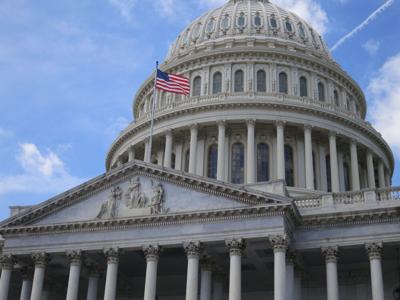Representative Scott Peters (D-CA-50), co-chair of the Bipartisan Fiscal Forum, celebrated the House Committee on Budget’s advancement of his Fiscal Commission Act and Fiscal State of the Nation Act, which will help reduce the nation’s long-term debt and secure a prosperous future. The Fiscal panel Act, co-authored with Representative Bill Huizenga (R-MI-4), offers a bipartisan, bicameral panel to address long-term debt, avert inevitable Social Security and Medicare cuts, and assure fiscal stability. The Budget Committee’s “manager’s amendment” strengthens the commission’s commitment to tax suggestions, public education, and federal investment budgetary benefits.

Photo from: The Center Square
A Bipartisan Approach to Long-Term Debt
Representative Peters promoted fiscal prudence and praised the bipartisan support for the Fiscal Commission Act and Fiscal State of the Nation Act. With a comprehensive approach to the nation’s long-term debt, the proposed committee avoids changes to Social Security and Medicare. Bipartisan cooperation in the Budget Committee’s decision shows a cohesive effort to handle the challenging fiscal landscape.
A “manager’s amendment” approved by the Budget Committee strengthens the Fiscal Commission Act’s scope and responsibility. The amendment requires the panel to make tax revenue recommendations, hold field hearings, and educate the public. It also stresses the necessity of identifying the budgetary benefits of federal investments in infrastructure, education, and child care to make decision-making more informed and inclusive.
Rep. Peters stressed that debt interest will exceed defense and Medicaid spending in the coming decade, emphasizing the seriousness of the situation. He stressed the need for honest spending and revenue negotiations to guarantee important goals like an enhanced child tax credit, affordable child care, and sustainable energy investments for the future. The Fiscal Commission Act helps address these issues and promote bipartisan discourse.
READ ALSO: Biden’s Crisis Crossroads
Social Security’s Imminent Cuts and Timely Action
Rep. Peters warned of a 23% across-the-board cut if action is not taken. He advised against delays because they could give benefit reduction advocates leverage. The commission wants to avoid catastrophic cuts and create a sustainable, equitable fiscal future by acting quickly.
Rep. Peters compared “regular order” to the elusive “Congressional ‘Big Foot,'” emphasizing that conventional tactics may not solve the complicated issue of long-term debt. He said a panel is needed because data suggests this issue won’t be resolved without a bipartisan effort. The proposed commission is a sensible approach to budgetary responsibility.
READ ALSO: No Labels Gains Political Party Status In Kansas, Eyes 2024 Ballot Nationwide
















































